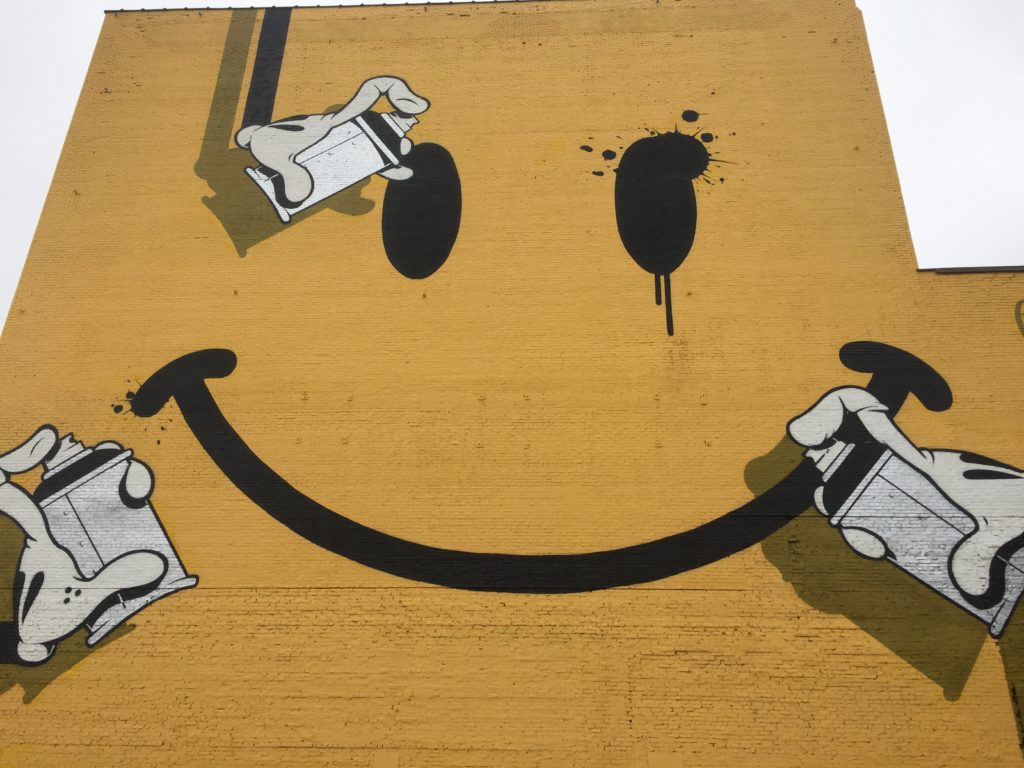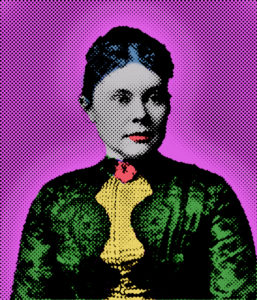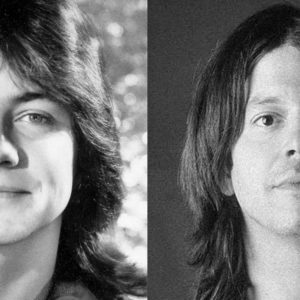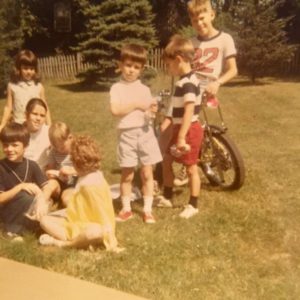
Part Three:
There are Prophets Everywhere
HISTORY OF PROPHETS IN AMERICA
In 1823 seventeen year old Joseph Smith was directed by the angel Moroni to a hillside in Wayne County, in upstate New York, where Smith unearthed a book (gold plates, held together with golden wire) purporting to be the history of an ancient people who once inhabited the North American continent. The buried book, ostensibly written by prophets of the bygone civilization, described the marine exodus of Israelites to the Western hemisphere in 600 BCE. According to the book, Moroni was the last prophet of the ancient people and had buried the record until the rightful prophet (Smith, presumably) could bring the history to light. The book’s language was not immediately accessible, but over the next few years the young hustler—steeped in schemes of itinerant Second Great Awakening preachers, folk magic and treasure seeking—supposedly translated the text from Reformed Egyptian into a King Jamesian styled English, with the assistance of magic spectacles, or seer stones set on a top hat (the record is not clear which). Thanks to uncanny marketing instincts and an eye for the nexus of mysticism and enterprising opportunism, Smith was well on his way to becoming a mover-and-shaker of an especially American marque: the confidence man, the necromancer, the political operator, an intermediary between mortals and higher realms. Several years earlier he had been dragged into court for a for-hire buried treasure finding scheme, but, emboldened by the support of several neighbors who bought the wild tale of a golden book buried on a hill, Smith printed an optimistic first run of 5000 copies of his translation (the Book of Mormon), and set about recruiting followers. Like lots of hustlers, he recognized from the beginning that the more audacious the tale of what he was selling the more devoted adherents would be; from its beginnings Mormonism appealed to an audience ready to accept the tenets of Christ in America, the mixed-up stories of the sailor/patriarchs, and the book’s subtext of American exceptionalism. Sticking to the contours of westward expansion, Smith and his followers left upstate New York for frontier towns in Ohio, Missouri, Illinois, looking to establish a new Zion in America. By the time Smith and his brother Hyrum and a few other Mormons tried to shoot their way out of a Carthage, Illinois jailhouse in 1844, the Mormon church had amassed some five thousand followers.
A messianic strain runs through the American consciousness. Near sacred screeds of optimism and self-faith inform our deepest feelings. We’re pretty confident that perfection, as Herbert Hoover, in the midst of the Great Depression, once said of prosperity, is right around the corner, and if a preacher or sorcerer or elixir salesman is going to tell us our faith is well-placed, well, we’re willing to listen. Since the earliest days of European settlement, when a Puritan lawyer like John Winthrop, anchored in the good ship Arabella off Salem Harbor, could write, “The Lord will be our God, and delight to dwell among us, as His own people,” to nineteenth century newspaper columnist John O’Sullivan’s manifest destiny exhortations, we take exceptionalism as birthright. So it might be no coincidence that the prophets who flatter our vanity have done a flourishing business since the earliest days of European settlement. Winthrop’s famous City of the Hill phrase of 1630 was, of course, always something of a utopian hustle, establishing conduct and conformity in the new land while showing the new immigrants how anointed they were.
What do Bronson Alcott, William Jennings Bryant, Sylvester Graham, Marcus Garvey, P T Barnum, John Humphrey Noyes, Kit Carson, Emma Goldman, Jonathan Edwards, William Walker, Carrie Nation, David Koresh, William Lloyd Garrison, Huey Newton, Robert Moses, Elizabeth Cady Stanton, Norman Mailer, John Brown, Aaron Burr, John O’Sullivan, Thomas Jefferson, L Ron Hubbard, Harriet Tubman, Father Coughlin, the Grimke sisters have in common? Maybe not a thing, not a thing—you could make that legitimate argument. A disparate crew to be sure. The individuals would likely have loathed the comparison, loathed each other, or at least made troubling dinner companions. But America in its practical everyday life demands to be remade, its ancestral lands plowed under, an ever-new America nurtured in its stead. Maybe such prophets have more in common than they don’t.
Look, of the plowed-under theory, Robert Moses makes an obvious exemplar, but Sylvester Graham—namesake of the Graham Cracker—could easily be another. Sylvester Graham wanted to remake America as thoroughly as Moses wanted to remake New York City: as a new Eden free of desire, appointing vegetarianism, theology, abstinence as tenets. Kit Carson’s genius wasn’t just in beaver trapping and surviving grizzly bear attacks. The real genius of Kit Carson was in serving as the exemplary type for a new nation: stiff buckskins, understanding the Blackfoot and Crow, leaning into the future in a way that readers of dime novels back east could consciously or unconsciously absorb into their understanding of the country. No need to go through the entire cast of characters above. But take a look at one more, if you have patience. Marcus Garvey. A Jamaican who’d moved to London and who, like Karl Marx and Bram Stoker, spent time in the Reading Room at the British Museum, bent on self-improvement, he launched the Universal Negro Improvement Association (UNIA) to, “promote a spirit of race pride, to reclaim the fallen and to assist in civilising the backward tribes of Africa.” Then in 1916, in the midst of the Great War, he sailed for the US, now a Tuskegee-influenced entrepreneur and full-fledged advocate for black separatism. In America, his advocacy of a reverse diasporic return of Caribbean and American blacks to Africa just happened to be perfectly in line with the aims of the KKK’s own version of racial separatism. (What’s more flawlessly ironic than Garvey’s association with the KKK, his chatting with the Grand Wizard?) Abolitionists, the NAACP, had long discarded repatriation as unworkable, nonsensical, another racist scheme, but in his streetcorner speeches Garvey touted the new African Zion as a just homeland. Dark skinned Americans, born in America, would find racial parity, and, incidentally, America would return to a pure Euro-founded model, all part of a race-based remaking of the country.
By 1842, Joseph Smith had been elected mayor of Nauvoo, Illinois, and, moreover, commanded the 2500 troop Nauvoo Legion, a Mormon militia almost one-third the size of the entire US Army. By 1844 he was running a legitimate national presidential campaign, promising a gradual end to slavery and protection of the liberties of Latter-day Saints and other minorities, among other things. That poor Joseph Smith ended up in the Carthage jailhouse, surrounded by a vigilante mob and shot down as he tried to leap from the second story, gives a fine lesson, perhaps, in our obsession with prophets, the way we salvage our dignity by our brutal repudiation of them. John Brown was hanged. William Walker shot by a firing squad. Marcus Garvey and Emma Goldman run out of the country. Robert Moses practically run out of town. According to Mormon lore, God prevented the vigilantes outside the jailhouse from cutting Smith’s head off as a souvenir, but the message was pretty clear: if you’re going to claim to operate in the oracular, prophetic mode, you better keep coming up with miracles.
P T Barnum famously boasted that “More persons on the whole are humbugged by believing in nothing than by believing in too much.” The Barnum Museum was full of hoaxes and humbuggery. But at the base of Barnum’s utopia of freaks, sideshow exhibits and menageries, the existential question loomed large: what did the museum’s exotic life represent if not a Darwinian disruption of old religious order, a gigantic taunt? On the whole Barnum was arguing for belief as a Kierkegaardian leap-of-faith, the fantastic as an end that justified itself and made you believe humbug wasn’t humbug after all. Believe big, believe all the way, believe in the face of annihilating white depths. And as with a gold book found in the woods, or the Graham cracker, or the bearded lady, you could always find something in America to believe in.
E Z L
Now…. Now he takes a device from the box in the trunk, cradles it a moment in its paper wrapping. The thing is it was made from from things you can get anywhere—smokeless gunpowder, paper clips, bb’s, Christmas tree bulbs, nine volt batteries. He’s proud of things made with his hands, design rendered from virtually nothing… clay into vases, vintage humbuckers in his Tele, fasteners holding the universe’s constituent elements together, fasteners a prevailing metaphor of cosmic coherence.
Already the person’s mail is there. A bill from MidAmerican Energy. Fliers from Target and Van Maur. A postcard. Hey Margi, check out the fish I caught. On the front of the postcard a man is holding a trout the size of a Volkswagen. Luke does not mean harm to Mrs Marjorie Haines of Eldridge, Iowa. I’m here to help you, to expose you, to inform you, the Manifesto says. There is no such thing as DEATH/VOID/END/NO MORE, it says. He slides the package into the back of the mailbox, followed by the Manifesto. Back in the Accord, he’s in no hurry. He stops a few hundred yards away, waits for Mrs Marjorie Haines of Eldridge, Iowa to come down the driveway, her hair scantly piled on her scalp.
He is a sculptor. A creator. A maker of art. Making a monument as staggering as Crazy Horse or Rushmore, across the entire continent. People will sit up and pay attention, people will stop staring numbly at their tvs and their video games, people will realize what they have done with their lives, and that they do not have to be slaves. He will inform them. He will be a conduit to their destinies. Illinois, Iowa, Colorado, Texas. A landscape transformed like Christo and Jeanne-Claude’s; people will gasp at the audacity of the creation. He is sounding an alarm to a country that does not know itself, that does not know it is a dying country. Question: Do you see the Smiley Face and the Manifesto as irony or unirony? Question: Do you become the body because the body happens to be flesh, or because the body holds immensities of knowledge of the universe?
He has a road name. The Accord’s license plate is EZL-873. E Z Luke drives southwest, he circles the towns on his accordianed map with a pen. Eldridge, Farley, Asbury, Tipton and Anamosa, Iowa. Mount Carroll, Morrison and Elizabeth, Illinois. He has traveled precisely 876.7 miles since Menomonie, according to the odometer. To cross the country from New York to Los Angeles is 2800 miles: driving straight through, minimal piss stops, two days. On the radio hears six bombs have exploded, injuring four mail carriers and two residents. Someone is paying attention. Casualties are to be expected, what could you do, but it’s a relief to know the bombs haven’t killed anyone so far. Death, he knows, is statistically possible, maybe probable, but he does not wait for it. He’s not like that. If there’s mail in the mailbox, he saves something with the person’s name, as a means of acknowledgement, tribute. He pulls into a rest area, shifts into park, rolls up the windows, slides the seat back, feels the sun’s rays, deflected through tinted windows, against the peach fuzz on his cheek. Hat over his eyes, he tries to catch a nap, as families, regular everyday families, couples his age, chit-chat in the afternoon sun. He hears someone say, I wouldn’t marry that guy now for all the tea in China.
The eye is seventy miles in diameter, almost exactly, covering the states of Iowa, Illinois, Wisconsin. It will take two eyes before they even have a hint of what he is up to. Luke is driving I-80 towards Davenport, Nebraska, when cop lights come on behind him. He holds his hands on the wheel, waiting. State cops have a way of lurching side to side, as if their bodies are in a constant state of trying to find equilibrium without ever arriving at it. When it comes to dealing with cops, he has to rein in the natural tendency to laugh in their faces.
How you doing today, sir?
Me? Oh, OK.
Know why I pulled you over?
No, sir. No.
Seatbelt law’s no joke in this state.
Yes, sir.
You ok?
Fine.
Sure?
Yes, Sir.
He looks at his license.
OK. Just asking. Cause— Minnesota, eh? Where you heading, Luke?
Colorado.
Friends there?
No, just wanted to take a look.
Must be nice. Free and easy. Being a kid.
I guess.
Just make sure you keep buckled up, ok?
The body is a temporary learning experience, he has written. You learn in the body, and play out of the body, he wrote.
In Davenport, Nebraska, there’s a water tower with the name of the town on it, there’s a Lutheran church made of brick and a little brick PO. There’s the Farmers Cooperative, and though the elevator is still there, lots of farmers bring their grain elsewhere these days, a guy in a Motorhead t-shirt and kinky blond hair and tattoos on his fingers that look like they were done by a third grader tells him. At its peak in the 1890s, the Motorhead guy says, Davenport’s population reached 513 and the town had every reason to believe there were better days ahead, but these days it’s dwindled to 306, it’s a place of relative stability and not quite desolation, the guy says. Luke Helder stretches his legs, lighting a joint. He takes the lay of the land, setting his sights along the tracks. There are a couple kids coming up along the banks, striding between the ties. Fourth or fifth graders. One of them has a swipe of fine hair on his upper lip and he’s a little overweight, and he trails three or four others, whose comparative youth gives them an air of authority and indomitability.
One of them says, What’re you smoking, mister?
None of your business.
I know.
He has tarnished-brass colored hair, a nimble kind of female way of negotiating the tracks, a cruelish stare.
E Z Luke says, What’d you do around here?
The one with tarnished brass-colored hair shrugs. E Z Luke waves the joint in front of them.
Nah.
Helps see things clearly.
The chubby kid takes it like he’s been smoking pot all his life, inhales, bends over in a coughing fit, a line of spittle coming off his lips. The joint lands perfectly on the rail. The boys laugh in a chorus at their friend’s expense, like their laughter was always ready to be deployed against him, or any worthy scapegoats. It’s a perfect day, no breeze, no bugs. The land around them is as still as any Luke’s ever seen, tan undulant hills rolling farther away to stranger and stranger universes, the hem of skyline broken only by a sad hotel, where, the way Luke pictures it, long-term tenants are preparing ramen noodles on hotplates in the furnished rooms.
Davenport, Nebraska sucks, says E Z Luke with an authority meant to be blandly impressive.
One of them, defensive, quick with civic pride, says, You get used to it.
They stand around, not really looking at each other, as if Luke has violated the sanctity of the group. On the other hand, he thinks, isn’t he teaching them something, isn’t he giving them something to think about beyond the railroad that once gave Davenportians the idea that they could establish their own oasis along the Kansas border, something to consider beyond these tracks? E Z Luke retrieves the joint, quick hit, passes it to a kid with grubby teeth who he can’t believe’s more than eight or nine. The kid brings it to lips complacently situated on the blooming face. He’s sweet enough looking in a finished way, not innocent exactly but you get the idea that the futures of kids like this aren’t much different from their presents. The aroma hovers in sweetly soggy miasma.
Who are you anyway?
Yeah.
What difference does it make?
What if I tell my parents?
I’m just passing through.
Perv. Child molester.
The chorus of laughter centers around him now.
He’s on a mission they could never understand no matter how he tried to explain it. When he was their age he would have laughed at a guy like him too, trying to insinuate himself in their closed kid society, walking the tracks like that. What would kids like this say if they knew a bomb could end up in one of their mailboxes? And wouldn’t it be the most incredible coincidence—not coincidence really but a convergence of destiny, a mark of inevitability—if these kids were in unknowing cahoots in getting his message out to the world, they served as his messengers and archangels.
He grabs the joint from the kid’s lips to shut them all up, flicks it into some scrub oak as they step back, collectively going silent, wary, god, he’s been on the road four days, five nights, he’s whacked, he’s imagining things, he’s remembering the shadows, his brain’s Shredded Wheat.











